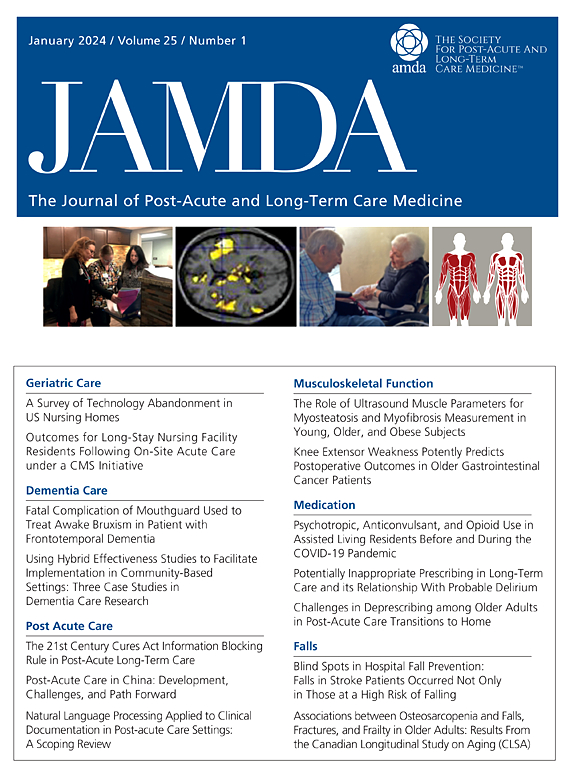Skin Ulcer Development and Deterioration of Social Engagement among Nursing Home Residents
IF 4.2
2区 医学
Q2 GERIATRICS & GERONTOLOGY
Journal of the American Medical Directors Association
Pub Date : 2025-02-11
DOI:10.1016/j.jamda.2024.105473
引用次数: 0
Abstract
Objectives
Skin ulcers are a critical indicator of quality of care in nursing homes that influence residents’ physical, psychological, and social health. The objective of this study is to understand the influence of developing skin ulcers on deterioration in social engagement in nursing home residents.
Design
Observational retrospective cohort study with 1-year follow-up.
Setting and Participants
Nursing home residents aged ≥50 years were followed quarterly (2008/2009–2009/2010), the latest years in which the Minimum Data Set 2.0 measured social engagement.
Methods
Cumulative incidence ratios (CIRs) and 95% CIs quantified the association between skin ulcer development and deterioration in residents’ social engagement levels.
Results
About 1.25% first developed new skin ulcers at the annual follow-up assessment; 1.22% developed skin ulcers at a quarterly assessment that persisted at the annual assessment, and 4.53% developed skin ulcers at a quarterly assessment that were resolved by annual assessment. Compared with residents who remained ulcer-free, those with new skin ulcer at annual assessment and persistent skin ulcers were at increased risk of experiencing a reduction in social engagement (CIR, 1.26; 95% CI, 1.11–1.44; CIR, 1.32; 95% CI, 1.16–1.50, respectively). Those with resolved skin ulcers were also at increased risk of social engagement deterioration (CIR, 1.12; 95% CI, 1.04–1.21) than those who remained ulcer-free.
Conclusion and Implications
Residents who develop skin ulcers are at a higher risk of deteriorating social engagement. Nursing home staff should strive not only to prevent and treat skin ulcers, but also to support social engagement for those with skin ulcers.
求助全文
约1分钟内获得全文
求助全文
来源期刊
CiteScore
11.10
自引率
6.60%
发文量
472
审稿时长
44 days
期刊介绍:
JAMDA, the official journal of AMDA - The Society for Post-Acute and Long-Term Care Medicine, is a leading peer-reviewed publication that offers practical information and research geared towards healthcare professionals in the post-acute and long-term care fields. It is also a valuable resource for policy-makers, organizational leaders, educators, and advocates.
The journal provides essential information for various healthcare professionals such as medical directors, attending physicians, nurses, consultant pharmacists, geriatric psychiatrists, nurse practitioners, physician assistants, physical and occupational therapists, social workers, and others involved in providing, overseeing, and promoting quality

 求助内容:
求助内容: 应助结果提醒方式:
应助结果提醒方式:


